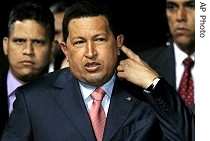2007年VOA标准英语-Many Venezuelans Uncertain About Chavez' '21st(在线收听)
Washington
09 July 2007
For years, Venezuelan President Hugo Chavez has spoken almost daily about his vision of so-called "21st Century socialism." Yet many Venezuelans of varying political persuasions are unsure what the slogan means and have great difficulty defining it in precise terms. VOA's Michael Bowman recently visited Caracas and has this report.
 |
| Hugo Chavez (file photo) |
"Now more than ever, I am obliged to move Venezuela's path towards socialism," he said.
But what, precisely, is his program of 21st Century socialism? Caracas university student Jesus Echeverria is not sure.
"I, for one, do not know what 21st Century socialism means," he says, "But it seems to me to be an arrangement in which the president can manipulate all the country's institutions."
Venezuelan attorney and former Information Minister Fernando Egaña gives a similar response.
"It is a great question that I am not able to answer because it has never been explained," He says. "In a practical sense, 21st Century socialism means indefinite re-election within a state with no separation of powers and without any institutional counterweights [to Chavez' authority]."
Earlier this year, Venezuela's national assembly, made up entirely of Chavez loyalists, voted to allow the president to rule by decree. Since then, an empowered Mr. Chavez has nationalized telecommunications and electric-power companies, renegotiated contractual arrangements with foreign oil corporations, and shut down an opposition-allied private television station.
Repeated requests for interviews with Venezuelan officials were not granted. But many Chavez supporters say 21st Century socialism means social and economic equality. They are quick to refute opposition accusations that 21st Century socialism is mere window-dressing for autocratic despotism.
Caracas resident Carolina Perez describes the president as her "idol."
"For eight years, the opposition has been saying that the revolutionary process will strip people of their businesses and take away their children for indoctrination," she says. "If the president were so inclined, he would already have done so."
Chavez backers say, for the first time, Venezuela's massive oil wealth is being used to benefit all citizens, not just the wealthy elite.
The president has launched massive social welfare campaigns in healthcare, education, food assistance and other areas. Even Mr. Chavez' critics concede that the popularity of these programs helped propel his re-election victory in December.
Venezuelan public-opinion pollster Luis Vicente Leon says the populist president has been intentionally vague in spelling out his program, allowing his followers to define it for themselves according to their interests.
"Chavez simply says that he represents 21st Century socialism," he says. "So if you like Chavez and I ask you what 21st Century socialism means, you will probably say 'Chavez' or 'a better distribution of oil wealth' or 'giving educational scholarships' or 'providing for the poor.' Well, these are all things that people like."
What is next on President Chavez' agenda? No one knows for sure, but he has threatened further crackdowns on the private news media, promised more expropriations of properties deemed "underutilized" by the state, and pledged to remain in power until the year 2030. For that to occur, Venezuela's constitution would have to be amended to eliminate executive term limits.